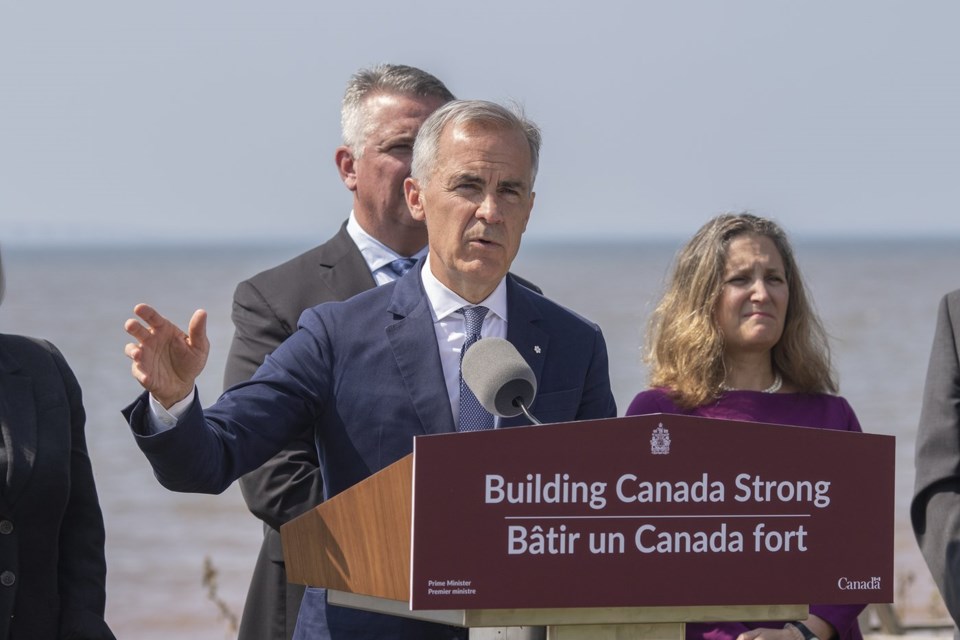WASHINGTON — Prime Minister Mark Carney said on Wednesday that Canada's negotiations with the United States might not conclude by Donald Trump's Aug. 1 deadline as the president added new trade measures that could further hinder some Canadian businesses.
Carney said talks have been complex, comprehensive and constructive. He also said they are ongoing and cover "a broad variety of topics."
"There are many areas for co-operation between Canada and the United States, including defence spending, security spending, investments, which is one of the reasons why we're having these broader discussions," Carney said at a news conference in Ottawa.
Trump sent a letter to Carney threatening to impose 35 per cent tariffs if Canada doesn't make a trade deal by Friday. The White House has said those duties would not apply to goods compliant with the Canada-U.S.-Mexico Agreement on trade, better known as CUSMA.
The Canadian economy is also being slammed by Trump's Section 232 tariffs on steel, aluminum and automobiles.
Trump on Wednesday signed executive orders for 50 per cent tariffs on semi-finished copper products starting Friday. The president, however, didn't include imports of the refined metal in his order, leaving many in the Canadian copper industry feeling relieved.
In a separate order, Trump suspended de minimis exemptions — which had allowed packages worth $800 or less to ship to the United States to avoid tariffs. As part of his reasoning for the change, Trump cited the flow of fentanyl into the United States.
Canadian Federation of Independent Business President and CEO Dan Kelly said suspending the de minimis exemption "is bad news for many Canadian small businesses." The federation's data shows about one-third of small Canadian exporters used the exemption to ship to U.S. consumers duty free, Kelly said in a post on social media.
Pascal Chan, the vice president of strategic policy and supply chains at the Canadian Chamber of Commerce, said it adds "another layer of uncertainty for Canadian businesses exporting to the U.S.," particularly small- and medium-sized businesses.
"Any increase in compliance costs and delivery delays will only serve to compound the pressure on the cross-border supply chains that have long fuelled our shared economic prosperity," Chan said in a statement.
The latest trade changes comes as countries around the world are set to face staggering tariffs when Trump's deadline to make deals passes.
Trump announced a deal with South Korea Wednesday which will see the country slapped with a 15 per cent tariff.
The president said South Korea "will give to the United States $350 Billion Dollars for Investments owned and controlled by the United States, and selected by myself, as President. In apost on social media Trump said South Korea will also "purchase $100 Billion Dollars of LNG, or other Energy products."
In a separate post the president also said he "concluded a Deal with the Country of Pakistan, whereby Pakistan and the United States will work together on developing their massive Oil Reserves" but Trump didn't provide details of a tariff rate.
Frameworks of deals have previously been announced for the European Union, Japan, Vietnam, Indonesia, the Philippines and the United Kingdom — with all nations facing some level of baseline tariff.
Not all the details of the deals are clear but Trump has said countries can "buy down" the tariff rate and most agreements have come with announcements of billion-dollar investments.
Trump on Wednesday also escalated his threats against Brazil — which will be hit a 50 per cent duty — and India — which will face a 25 per cent tariff, plus an additional import tax because of India purchases Russian oil.
Trump has been dismissive of conversations with Canada, saying it is not a priority for his administration. The president said Wednesday that America's northern neighbour is a high-tariff nation, misrepresenting Canadian duties for agriculture imports.
"They've been charging our farmers 200 per cent, 300 per cent, 400 per cent for years and nobody did anything about it," Trump told reporters.
Carney met virtually with his cabinet earlier Wednesday for a meeting focused largely on the situation in the Middle East.
Carney said Canada is seeking the best deal for Canadians and that negotiations will continue until that is achieved. He said Dominic LeBlanc, the minister responsible for Canada-U.S. trade, will remain in Washington with senior officials "in pursuit of that goal."
— With files from Catherine Morrison
This report by The Canadian Press was first published July 30, 2025.
Kelly Geraldine Malone, The Canadian Press




